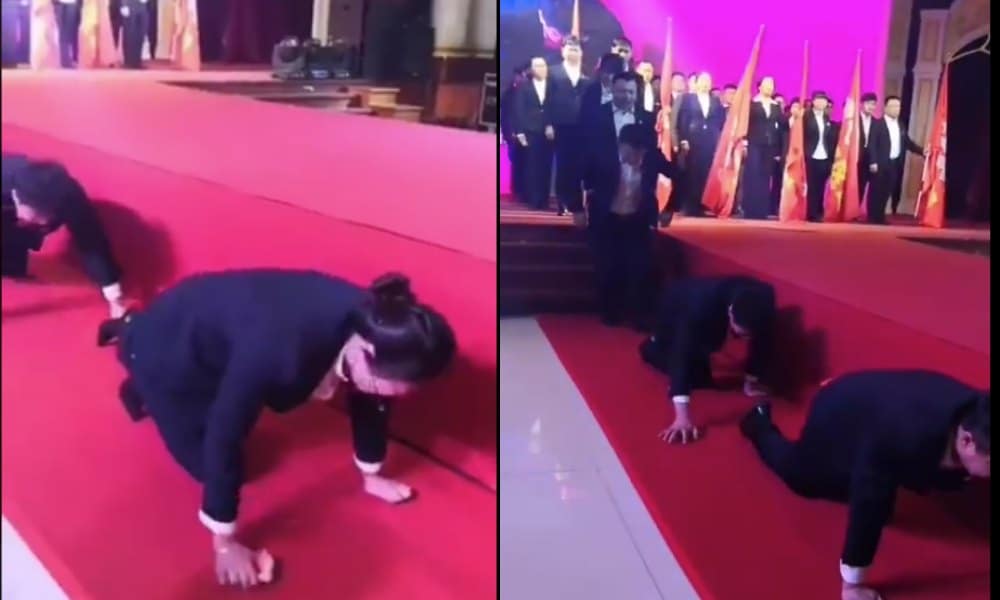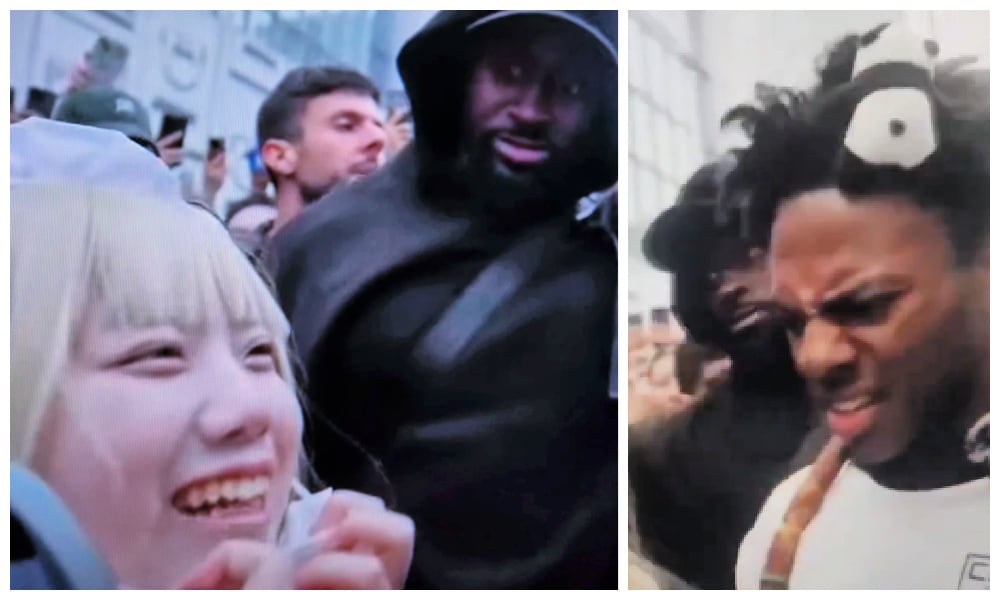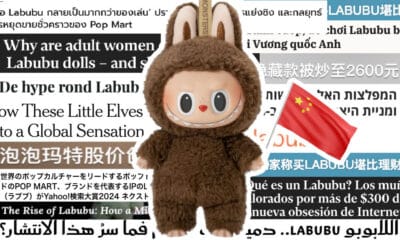China Memes & Viral
Video of Chinese Employees Crawling on Ground at Annual Dinner Goes Viral
Employees crawling on the ground during annual business dinner: “Is this really the year 2020?”
Published
5 years agoon
By
Bobby Fung
A somewhat bizarre video made its rounds on Chinese social media this week, showing Chinese employees crawling on their hands and feet during an official event.
The video, that was recorded during a Chinese New Year annual company dinner, was first posted by a popular Weibo blogger (@社畜茶水间) on January 18.

The 15-second clip shows how both men and women dressed in formal attire crawl on the ground while loudly repeating: “I had promised, I take responsibility” (“我承诺,我担当”). The scene was filmed by one of the people attending the annual dinner.
With over 21,620 shares on Weibo and over 300,000 ‘likes,’ the post stirred controversy among Chinese netizens this week. A hashtag relating to the incident received approximately 60 million views (#业绩没达标在年会上爬三圈#).
网友爆料
赏赏年会的企业文化。年中承诺业绩没达标的高层爬三圈,哭喊我承诺我担当。也不征求大家我去留意见了,我要过完年会快逃。 pic.twitter.com/0KUalLNBwO— 🐟🏀🚿 Qiuyu Yu (@FYcXMFYL7ddnQzu) January 19, 2020
According to the post, crawling on the ground is a punishment for those employees who fail to achieve their promised sales performance. The company was later identified as a Chinese food and beverage corporation.
The majority of netizens criticized the video. Many consider the punishment to be degrading to these individuals, calling it a “practice of slavery.”
Employees of the company have reportedly responded to the controversy, saying that nobody was forced to crawl on the ground and that it was a “voluntary” action. The response was widely disregarded on Weibo.
This is not the first time a video like this, in which employees seemingly punished in bizarre ways, goes viral on Chinese social media.
In 2017, another video in which employees slapped each other’s face with great force also spread on Weibo.
The rise of these peculiar business practices result partly from the growing focus on “wolf culture” (狼性文化), a term that was popularized by tech giant Huawei and was meant to promote a team spirit among employees.
Although “wolf culture” should encourage strong teamwork, it is also used by some companies to justify the cruelty of these kinds of punishment.
In an online poll by Sina Tech asking Weibo users if they would quit their job if their work environment was similar to that in the video, 70% of respondents indicated that they would not tolerate such a situation at all. Over 2000 of the survey respondents, some 15%, indicated that they would not necessarily quit their job.
“Watching this video, I wondered, are we really in the year 2020?” one Weibo commenter asked.
By Bobby Fung (@bobbyfungmr)
Follow @whatsonweibo
Spotted a mistake or want to add something? Please let us know in comments below or email us. First-time commenters, please be patient – we will have to manually approve your comment before it appears.
©2020 Whatsonweibo. All rights reserved. Do not reproduce our content without permission – you can contact us at info@whatsonweibo.com.
Bobby is a junior at New York University studying Politics and Philosophy. His main focus is political philosophy and East Asian politics, while also learning data science and Japanese on the side.

China ACG Culture
Inside the Labubu Craze and the Globalization of Chinese Designer Toys
Labubu is not ‘Chinese’ at all—and at the same time, it is very much a product of present-day China.
Published
4 weeks agoon
June 8, 2025
Labubu – the hottest toy of 2025 – is making headlines everywhere these days. The little creature is all over TikTok, and from New York to Bangkok and Dubai, people are lining up for hours to get their hands on the popular keyring doll.
In the UK, the Labubu hype has gone so far that its maker temporarily pulled the toys from all of its stores for “safety reasons,” following reports of customers fighting over them. In the Netherlands, the sole store where fans can buy the toys also had to hire extra security to manage the crowds, and Chinese customs authorities have intensified their efforts to prevent the dolls from being smuggled out of the country.
While the Labubu craze had slightly cooled in China compared to its initial peak, the character remains hugely popular and surged back into the top trending charts with the launch of POP MART’s Labubu 3.0 series in late April 2025 (which instantly sold out).
Following the global popularity of the Chinese game Black Myth: Wukong, state media are citing Labubu as another example of a successful Chinese cultural export—calling it ‘a benchmark for China’s pop culture’ and viewing its success as a sign of the globalization of Chinese designer toys.
But how ‘Chinese’ is Labubu, really? Here’s a closer look at its cultural identity and the story behind the trend.
The Journey to Labubu
In the perhaps unlikely case you have never heard of Labubu, I’ll explain: it’s a keyring toy with a naughty and, frankly, somewhat bizarre face and gremlin-like appearance that comes in various colors and variations. It’s mainly loved by young (Gen Z) women, who like to hang the toys on their bags or just keep them as collectibles.
The figurine is based on a character created by renowned Hong Kong-born artist Kasing Lung (龍家昇/龙家升, born 1972), whose work is inspired by Nordic legends of elves.

Kasung Lung, image via Bangkok Post.
Lung’s story is quite inspirational, and very international.
As a child, Lung immigrated to the Netherlands with his parents. Struggling to learn Dutch, young Kasing was given plenty of picture books. The picture books weren’t just a way to connect with his new environment, it also sparked a lifelong love for illustration.
Among Kasing’s favorite books were Where the Wild Things Are by Maurice Sendak and those by Edward Gorey — all full of fantasy, with some scary elements and artistic quality.
Later, as his Dutch improved, Kasing became an avid reader and turned into a true bookworm. The many fantasy novels and legendary tales he devoured planted the seed for creating his own world of elves and mythical creatures.

Kasing as a young boy on the right, and one of his children’s illustration books on the left.
After initially returning to Hong Kong in the 1990s, Lung later moved back to the Netherlands and eventually settled in Belgium.
Following a journey of many rejections and persistence, he began publishing his own illustrations and picture books for the European market.

Image via Sina.
In 2010, Hong Kong toy brand How2work’s Howard Lee reached out to Lung. One of How2work’s missions is cultivating creative talent and supporting the Hong Kong art scene. Lee invited Kasung to turn his illustrations into 3D, collectible figurines. Kasung, a collector of Playmobil figures since childhood, agreed to the collaboration for the sake of curiosity and creativity.
Lung’s partnership with How2work marked a transition to toy designer, although Lung also continued to stay active as an illustrator. Besides his own “Max is moe” (Max is tired) picture book, he also did illustrations for a series by renowned Belgian author Brigitte Minne (Lizzy leert zwemmen, Lizzy leert dansen).
A few years later, Lung introduced what would become known as The Monsters Trilogy: a fantasy universe populated by elf-like creatures. Much like The Smurfs, the Monsters formed a tribe of distinct characters, each with their own personalities and traits, led by a tribal leader named Zimomo.

With its quirky appearance, sharp teeth, and mischievous grin, Labubu stood out as one of the long-eared elves.
When Labubu Met POPMART
Although the Labubu character has been around since 2015, it took some time to gain fame. It wasn’t until Labubu became part of POP MART’s (泡泡玛特) toy lineup in 2019 that it began reaching a mass audience.
POP MART is a Chinese company specializing in artsy toys, figurines, and trendy, pop culture-inspired goods. Founded in 2010 by a then college student, the brand launched with a mission to “light up passion and bring joy,” with a particular focus on young female consumers (15-30 age group) (Wang 2023).
One of POP MART’s most iconic art toy characters—and its first major commercial success—is Molly, designed by Hong Kong artist Kenny Wong in collaboration with How2work.
Prices vary depending on the toy, but small figurines start as low as 34 RMB (about US$5), while collectibles can go as high as 5,999 yuan (US$835). Resellers often charge significantly more.

Pop Mart and its first major commercial success: Molly (source).
POP MART is more than just a store, it’s an operational platform that covers the entire chain of trendy toys, from product development to retail and marketing (Liu 2025).
Within a decade of opening it first store in Beijing, POP MART experienced explosive growth, expanded globally, and was listed on the Hong Kong Stock Exchange.
The enormous success of POP MART has been the subject of countless marketing studies, drawing various conclusions about how the company managed to hit such a cultural and commercial sweet spot beyond its mere focus on female Gen Z consumers.
🎁 Gamifying consumption | One common conclusion about the success of POP MART, is that it offers more than just products—it offers an experience. At the heart of the brand is its signature blind box model, where customers purchase mystery boxes from specific product lines without knowing which item is inside. Those who are lucky enough will unpack a special ‘hidden edition.’ Originating in Japanese capsule toy culture, this element of surprise gamifies the shopping experience, makes it more shareable on social media, and fuels the desire to complete collections or hunt for rare figures through repeat purchases.
🌍 Creating a POP MART universe | Although POP MART has partnerships with major international brands such as Disney, Marvel, and Snoopy, it places a strong focus on developing its own intellectual property (IP) toys and figurines. In doing so, POP MART has created a universe of original characters, giving them a life beyond the store through things like collaborations, art shows and exhibitions, and even its own theme park in Beijing.
💖 Emotional consumption | What makes POP MART particularly irresistible to so many consumers is the emotional appeal of its toys and collectibles. It taps into nostalgia, cuteness, and aesthetic charm. The toys become companions, either as a desktop buddy or travel buddy. Much of the toys’ value lies in their role as social currency, driven by hype, emotional gratification, and a sense of social bonding and identity (Ge 2024).
The man behind POP MART and its strategy is founder and CEO Wang Ning (王宁), a former street dance champion (!) and passionate entrepreneur with a clear vision for the company. He consistently aims to discover the next iconic design, something that could actually rival Mickey Mouse or Hello Kitty.
In past interviews, Wang has discussed how consumer values are gradually shifting. The rise of niche toys into the mainstream, he says, reflects this transformation. Platforms like Douyin, China’s strong e-commerce infrastructure, and the digital era more broadly have all contributed to changing attitudes, where people are increasingly buying not for utility, but for the sake of happy moments.
While Wang Ning dreams of a more joyful world, he also knows how to make money (with a net worth of $20.3 billion USD, it was actually just announced that he’s Henan’s richest person now)—every new artist and toy design under POP MART is carefully researched and strategically evaluated before being signed.
Labubu’s journey before its POP MART partnership had already shown its appeal: Kasing Lung and How2Work had built a small but loyal fanbase pre-2019. But it was through the power of POP MART that Labubu really reached global fame.
Labubu: Most Wanted
Riding the wave of POP MART’s global expansion, Labubu became a breakout success, eventually evolving into a global phenomenon and cultural icon.
Now, celebrities around the world are flaunting their Labubus, further fueling the hype—from K-pop star Lisa Manobal to Thai Princess Sirivannavari and Barbadian singer Rihanna.
In China, one of the most-discussed topics on social media recently is the staggering resale price of the Labubu dolls.

Third edition of the beloved Labubu series titled “Big into energy” (Image via Pop Mart Hong Kong).
“The 99 yuan [$13.75] Labubu blind box is being hyped up to 2,600 yuan [$360]” (#99元Labubu隐藏款被炒至2600元#), Fengmian News recently reported.
Labubu collaborations and limited editions are even more expensive. Some, like the Labubu x Vans edition, originally retailed for 599 yuan ($83) and are now listed for as much as 14,800 yuan ($2,055).
Recently, Taiwanese singer and actor Jiro Wang (汪东城) posted a video venting his frustration over scalpers buying up all the Labubus and reselling them at outrageous prices. “It’s infuriating!” he said. “I can’t even buy one myself!” (#汪东城批Labubu黄牛是恶人#).
One Weibo hashtag asks: “Who is actually buying these expensive Labubus?” (#几千块的Labubu到底谁在买#).
Turns out—many people are.
Not only is Labubu adored and collected by millions, an entire subculture has emerged around the toy. Especially in China, where Labubu was famous before, the monster is now entering a new phase: playful customization. Fans are using the toy as a canvas to tell new stories and deepen their emotional connection, transforming Labubu from a collectible into a DIY project.

Labubu getting braces and net outfits – evolving from collectible to DIY project.
There’s a growing trend of dressing Labubu in designer couture or dynastic costumes (Taobao offers a wide array of outfits), but fans are going further—customizing flower headbands, adorning their dolls with tooth gems, or even giving them orthodontic braces for their famously crooked teeth (#labubu牙套#).
In online communities, some fans have gone as far as creating dedicated generative AI agents for Labubu, allowing others to generate images of the character in various outfits, environments, and scenarios.

Labubu AI by Mewpie.
It’s no longer just the POP MART universe—it’s the Labubu universe now.
“Culturally Odorless”
So, how ‘Chinese’ is Labubu really? Actually, Labubu is not ‘Chinese’ at all—and at the same time, it is very much a product of present-day China.
🌍 Not Chinese at all
Like other famous IP characters, from the Dutch Miffy to Japan’s Pikachu and Hello Kitty, Labubu is “culturally odorless,” a term used to refer to how cultural features of the country of invention are absent from the product itself.
The term was coined by Japanese scholar Koichi Iwabuchi to describe how Japanese media products—particularly in animation—are designed or marketed to minimize identifiable Japanese cultural traits. This erasure of “Japaneseness” helped anime (from Astro Boy to Super Mario and Pokémon) become a globally appealing and commercially successful cultural export, especially in post-WWII America and beyond.
Moreover, by avoiding culturally or nationally specific traits, these creations are placed in a kind of fantasy realm, detached from real-world identities. Somewhat ironically, it is precisely this neutrality that has made Japanese IPs so distinctively recognizable as “Japanese” (Du 2019, 15).
Many Labubu fans probably also don’t see the toy as “Chinese” at all—there are no obvious cultural references in its design. Its style and fantasy feel are arguably closer to Japanese anime than anything tied to Chinese identity.
When a Weibo blogger recently argued that Labubu’s international rise represents a more powerful example of soft power than DeepSeek, one popular reply asked: “But what’s Chinese about it?”
🇨🇳 Actually very Chinese
Yet, Labubu is undeniably a product of today’s China—not necessarily because of Kasing Lung (Hong Kong/Dutch/Belgian) or How2work (Hong Kong), but because of the Beijing-based POP MART.
Wang Ning’s POP MART is a true product of its time, inspired by and aligned with China’s new wave of digital startups. From Bytedance to Xiaohongshu and Bilibili, many of China’s most innovative companies move beyond horizontal product offerings or traditional service goals. Instead, they think vertically and break out of the box—evolving into entire ecosystems of their own. (Fun fact: the entrepreneurs behind these companies were all born in the 1980s, between 1983 and 1989).
In that sense, state media like People’s Daily calling Labubu “a benchmark of China’s pop culture” isn’t off the mark.
Still, some marketing critics argue there’s room for more ‘Chineseness’ in Labubu and POP MART’s brand-building strategies—particularly through collections inspired by Chinese heritage, which could further promote national culture on the global stage (Wang 2023).
Meanwhile, Chinese official channels have already begun positioning Labubu as a cultural ambassador. In the summer of 2024, a life-sized Labubu doll embarked on a four-day tour of Thailand to celebrate the 50th anniversary of China–Thailand diplomatic relations.

The life-sized mascot of a popular Chinese toy character, Labubu, visited Bangkok landmarks and was named “Amazing Thailand Experience Explorer” to boost Chinese tourism. Photo Credit: Facebook/Pop Mart, via TrvelWeekly Asia.
In the future, Labubu, just like Hello Kitty in Japan, is likely to become the face of more campaigns promoting tourism and cross-cultural exchange.
Whatever happens next, it’s undeniable that Labubu stands at the forefront of a breakthrough moment for Chinese designer toys in the global market, and, from that position, serves as a unique ambassador for a new wave of Chinese creative exports that resonate with international audiences.
For now, most Labubu fans, however, don’t care about all of that – they are still on the hunt for the next little monster, and that’s enough to keep the Labubu hype burning.🔥
By Manya Koetse
(follow on X, LinkedIn, or Instagram)
References (other sources included in hyperlinks)
• Du, Daisy Yan. 2019. Animated Encounters: Transnational Movements of Chinese Animation, 1940-1970s. Honolulu: University of Hawaii Press.
• Ge, Tongyu. 2024. “The Role of Emotional Value of Goods in Guiding Consumer Behaviour: A Case Study Based on Pop Mart.” Proceedings of the 5th International Conference on Education Innovation and Philosophical Inquiries. DOI: 10.54254/2753-7048/54/20241623.
• Liu, Enyong. 2025. “Analysis of Marketing Strategies of POP MART,” Proceedings of the 3rd International Conference on Financial Technology and Business Analysis DOI: 10.54254/2754-1169/149/2024.
• Wang, Zitao. 2023. “A Case Study of POP MART Marketing Strategy.” Proceedings of the 2023 International Conference on Management Research and Economic Development. DOI: 10.54254/2754-1169/20/
Spotted a mistake or want to add something? Please let us know in comments below or email us. First-time commenters, please be patient – we will have to manually approve your comment before it appears.
©2025 Whatsonweibo. All rights reserved. Do not reproduce our content without permission – you can contact us at info@whatsonweibo.com.
China Memes & Viral
Strange Encounter During IShowSpeed’s Chengdu Livestream
The cosplaying girl, who usd the n-word and told the American YouTuber how racist she was, seems to have been referencing a meme.
Published
3 months agoon
March 31, 2025
After visiting Shanghai, Beijing, and the Shaolin Temple in Henan, popular American YouTuber IShowSpeed (Darren Watkins) livestreamed from Chengdu on March 31.
During his stream, he visited a Traditional Chinese Medicine practitioner, tried acupuncture, had some extremely spicy hotpot, and continued doing the kinds of activities that have defined his China tour so far – from kung fu to the Forbidden City.
The trip has been a success not just for Watkins, who recently surpassed 37 million YouTube subscribers, but also for China’s image abroad. Some have even suggested it’s become more of a soft power or propaganda tour (read more in our latest newsletter).
But not everything has gone smoothly. Within the span of a week, Watkins has become significantly more famous in China. In addition to YouTube — which is not accessible in China — he also began streaming on Douyin. All of this made his March 31st livestream a bit more chaotic, and for the first time, he also experienced some connection issues.
In Chengdu, with as many as 4 million viewers watching the livestream on Douyin, one moment in particular sparked controversy online. Just before Watkins entered a car, a girl in cosplay attire approached him and said:

💬 “I am a racist. I am a ni**a killer. I am so sorry about that. But I love your girlfriend, because your girlfriend is my [white?] people.”
When Watkins asked if she spoke English, she replied:
💬 “Yes, I am a racist. I am racist.”
After the incident, Watkins commented:
💬 “I don’t think she understood what she was saying.”
Watch the video here.
The girl was cosplaying as one of the characters from the mobile role-playing game Blue Archive, most likely Saiba Momoi (才羽モモイ), known for her mouse-like appearance, complete with two ears on top of her head.

On Chinese social media platforms, including Weibo and Xiaohongshu, the moment soon became a point of discussion. Among the commenters, there are those fearing the incident will negatively impact the image of Chengdu, and some suggesting the local Tourism & Culture Board will make sure to blacklist the girl.
Others focused more on the background of the girl, suggesting she is from Japan or Hong Kong, and trying to sabotage Watkins’ positive China trip.
It appears, however, that the female cosplayer may have been referencing the “racist Momoi” or “Saiba Momoi Says The N-Word” meme.
This meme originates from an edited clip of Saiba Momoi, in which she appears to say what sounds like the N-word. According to the Danbooru site, the clip was later modified to include other slurs.
The character has also been linked to the “Nàge song.” As explained in our newsletter yesterday, the song “Sunshine, Rainbow, White Pony” (阳光彩虹小白马) by Chinese singer Wowkie Zhang (大张伟), which repeatedly features the Chinese word nàge in its chorus (meaning “uh” or “that”) — popped up multiple times during Watkins’ trip. The catchy tune essentially became the theme song of his visit.
A few years back, a clip of Watkins first hearing the song and mistaking the chorus for the N-word already went viral on Chinese social media. The confusion between the Chinese filler word and the slur has been extensively joked about by Watkins himself throughout his streams.
The connection between the girl, the Saiba Momoi meme, and the Nàge song, however, is only known to a niche audience. It is possible that the girl tried to be funny, but she obviously failed in doing so.
By Manya Koetse
(follow on X, LinkedIn, or Instagram)
Spotted a mistake or want to add something? Please let us know in comments below or email us. First-time commenters, please be patient – we will have to manually approve your comment before it appears.
©2025 Whatsonweibo. All rights reserved. Do not reproduce our content without permission – you can contact us at info@whatsonweibo.com.
Subscribe

Jiehun Huazhai (结婚化债): Getting Married to Pay Off Debts

Yearnings, Dreamcore, and the Rise of AI Nostalgia in China

Beauty Influencer Du Meizhu Accused of Scamming Fan Out of $27K

Inside the Labubu Craze and the Globalization of Chinese Designer Toys

Lured with “Free Trip”: 8 Taiwanese Tourists Trafficked to Myanmar Scam Centers

China Is Not Censoring Its Social Media to Please the West

IShowSpeed in China: Streaming China’s Stories Well

Inside the Labubu Craze and the Globalization of Chinese Designer Toys

China Reacts: 3 Trending Hashtags Shaping the Tariff War Narrative

China Trending Week 15/16: Gu Ming Viral Collab, Maozi & Meigui Fallout, Datong Post-Engagement Rape Case

Chinese New Nickname for Trump Mixes Fairy Tales with Tariff War

Strange Encounter During IShowSpeed’s Chengdu Livestream

No Quiet Qingming: From High-Tech Tomb-Sweeping to IShowSpeed & the Seven China Streams

Understanding the Dr. Xiao Medical Scandal

From Trade Crisis to Patriotic Push: Chinese Online Reactions to Trump’s Tariffs
Get in touch
Would you like to become a contributor, or do you have any tips or suggestions? Get in touch here!
Popular Reads
-

 China Media12 months ago
China Media12 months agoA Triumph for “Comrade Trump”: Chinese Social Media Reactions to Trump Rally Shooting
-

 China Memes & Viral12 months ago
China Memes & Viral12 months agoThe “City bu City” (City不City) Meme Takes Chinese Internet by Storm
-

 China Society9 months ago
China Society9 months agoDeath of Chinese Female Motorcycle Influencer ‘Shigao ProMax’ Sparks Debate on Risky Rides for Online Attention
-

 China World11 months ago
China World11 months agoChina at Paris 2024 Olympics Trend File: Medals and Moments on Chinese Social Media




